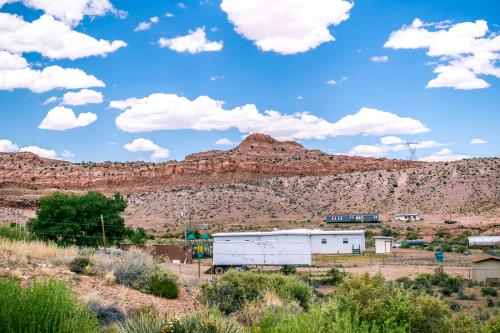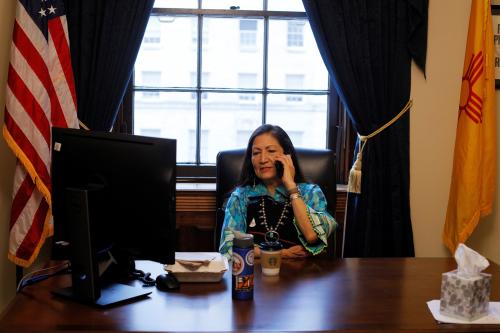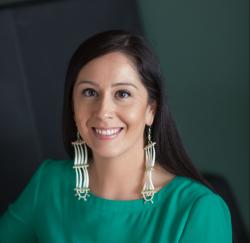A CDC report revealed COVID-19 incidence rates were 3.5 times higher for American Indians/Alaska Natives (AI/ANs) compared to White Americans during the first 7 months of the pandemic. A recent analysis by APM Research Lab provides a heartbreaking update: one in 475 AI/ANs has died from COVID-19, compared to one in 825 for White Americans and one in 645 for Black Americans. These staggering inequities are underestimates due to inadequate data collection practices preventing us from knowing the true impact of COVID-19 losses for AI/ANs. Further, these losses are set against a backdrop of widening health inequities for AI/ANs rooted in settler colonialism, intergenerational trauma, and continued structural racism – including the federal government’s failure to uphold its trust and treaty responsibilities to tribal nations guaranteeing health, education, and public safety services. COVID-19 has in new ways illuminated the long legacy of neglect and oppression of AI/ANs by the U.S. government and society at large. It has also shone light on cultural and community strengths including the power of tribal self-determination in the fight against the pandemic.
Statistics are but written enumeration of the loss of our relatives: grandparents, parents, sisters, brothers, nieces, nephews, aunties, uncles, children, friends, community members. The loss of Elders is profoundly painful given their wisdom and status as cultural knowledge and language keepers. Tribal languages reflect worldviews, traditions, and an intergenerational connection to ancestors, relatives, and future generations; the impact of these personal and cultural losses cannot be overstated. Simultaneously, Indigenous communities’ demonstrations of strength throughout the pandemic offer inspiration for creative, value-driven public health responses we all should heed with admiration.
There is tremendous diversity across Indigenous groups, including 574 federally recognized Tribes in the U.S. Still, a common theme across cultures is emphasis on relationships (to oneself, others, ancestors, generations yet to come, and the natural world) and connectedness. These communal values are critical to wellbeing and reflected in cultural teachings. Drawing upon our own experiences, Anishinaabe (Ojibwe) cultural teachings ask us to consider and honor 7 generations (3 before us, 3 after us, and our own spirit) throughout thoughts and actions. Ojibwe elders and culture bearers speak about respect (manaaji’idiwin) as a core teaching, one that honors the spirit in all things and develops through deep relationships with one another and ourselves. In Tsalagi (Cherokee) culture, our community values guide daily life and it’s our obligation to sustain them. Two of these values include to “treat each other’s existence as being sacred or important” (ulisgedi detsadayelvsesdi) and “you all take responsibility for one another’s well-being” (detsadaligenvdisgesdi) (values credited to the late Cherokee Nation cultural keeper, Benny Smith).
Such values are enacted in Indigenous approaches to leadership, described[i1] as centering collective perspectives as opposed to individual gain and representative of resistance to ongoing systems of oppression. Rapid, Tribally-based policy and public health responses to address COVID-19 infection and spread is an illustration of Tribal Sovereignty, the inherent right of Tribes to govern themselves and operate as independent nations within the U.S. As we describe below in just a few examples amongst countless others, the innovations and impacts of Indigenous leadership during the pandemic provide striking examples of Indigenous peoples paving the way to protect communities and promote wellbeing.
The Cherokee Nation has been a national leader in vaccine distribution and has demonstrated its care and protection for Elders and cultural knowledge keepers. Phase 1 of the Tribe’s vaccine distribution plan included first language Cherokee speakers, Elders, and Cherokee National Treasures (i.e., revered individuals distinguished by the Tribe and Cherokee National Historical Society who preserve and continue traditional culture and arts).[ii] The significance of this decision upholds Tsalagi (Cherokee) community values and promotes transmission of our language and ways of living for future generations. Hundreds of other Tribes across the U.S. have enacted similar policies exemplifying connectedness and taking care of all relatives. For example, some Tribes have expanded vaccine rollout to non-Native community members, family members, and Indigenous peoples from Canada. Other tribally-based public health responses include a creative reimagining of how we utilize existing resources, something Tribal Sovereignty enables at local levels. For instance, early in the pandemic, Department of Natural Resources workforce members at the Bois Forte Band of Ojibwe gathered and delivered traditional medicines to elders, who were sheltering in place in their homes. In a more sweeping move, the Red Lake Nation in Minnesota issued Medical Martial Law to protect the health and safety of tribal citizens throughout the pandemic.
Beyond individual Tribes and communities, national advocacy also exemplifies Indigenous leadership. For example, IllumiNative, a national Native-led nonprofit, launched a “Warrior Up” campaign mobilizing Native communities, artists, and allies to collectively fight against COVID-19. Powerful materials are viewable and shareable, including artwork, videos to motivate action that incorporate Native humor, a podcast, and educational flyers. This campaign seeks to promote visibility and inclusion of Native voices and communities in solutions to the COVID-19 pandemic to save lives and create pathways for inclusion and accurate narratives about Indigenous peoples.
With a collaborating team of Indigenous activists, policy makers, and elders, and inspired by the leadership of AI/ANs during this pandemic, we are putting our hearts and minds together to honor these types of incredible stories of strength proliferating across Native Country. We will soon launch a RWJF funded website (www.indigenousstrengths.com) to feature such stories as a multi-media virtual showcase highlighting Indigenous leadership during the COVID-19 pandemic. Through this collaborative work, we humbly strive to build upon countless Native-led campaigns to celebrate Indigenous leadership. We, as Indigenous academics, have so much to learn from AI/AN communities. It is our hope that teachings from Indigenous leaders and communities about connectedness and taking care of one another are lessons the world can learn from now and in the future. We would all do well to center the spirit of our relations as we work to protect one another not only during the pandemic, but moving forward in our daily lives.
Victoria M. O’Keefe, PhD (Cherokee Nation/Seminole Nation) is the Mathuram Santosham Endowed Chair in Native American Health, Johns Hopkins University; Assistant Professor, Department of International Health, Center for American Indian Health, Johns Hopkins Bloomberg School of Public Health; Licensed Psychologist
Melissa L. Walls, PhD (Bois Forte and Couchiching First Nation Anishinaabe) is the Bloomberg Associate Professor of American Health, Department of International Health, Johns Hopkins Bloomberg School of Public Health; Director, Great Lakes Hub, Johns Hopkins Center for American Indian Health
Footnotes
[i] Voyageur, C., Brearley, L., & Calliou, B. (2014). Restorying Indigenous Leadership. Restorying indigenous leadership: Wise practices in community development, 329-342.
[ii] Cain, S.M., Jumper Thurman, P., Cherokee National Treasures, Cherokee Nation, Oklahoma. (2017). Cherokee National Treasures: In Their Own Words. University of Oklahoma Press, Norman, Oklahoma.








Commentary
Indigenous communities demonstrate innovation and strength despite unequal losses during COVID-19
April 2, 2021